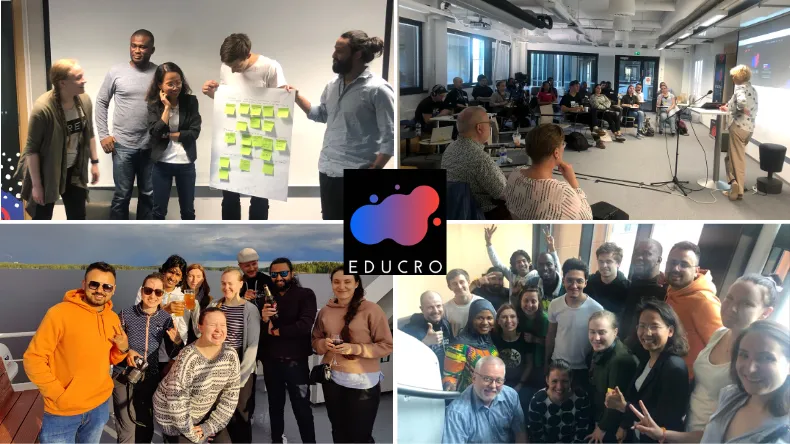The EDUCRO Summer Camp experiences

On June 6-10, 2022, an interdisciplinary group of students from LAB and Humak met at the EDUCRO Summer Camp 2022 to learn about current challenges and opportunities in the culture and tourism sectors. These students studied and spent their free time together for five days at the LAB campus in Lappeenranta. The Summer Camp was jointly organized by LAB University of Applied Sciences and Humak University of Applied Sciences as a part of EDUCRO project activities. The project is co-funded by the European Union.
The camp's theme was "Sustainable value and business creation in the culture and tourism sectors: current trends". The camp's program was structured from getting acquainted with the goals of sustainable development to diving into its different aspects and practical acquaintance with current tools and technologies.
Almost all speakers of the Summer camp mentioned that the world is changing and that rapid changes have been taking place recently, both globally and technologically. As a result, humanity is facing new challenges that require people to be engaged, responsible, flexible and able to manage the situation in a changing world and to use a holistic approach, as well as requiring new ways of thinking and a new vocabulary. When the habitual way of life is interrupted and threatened, people often feel the need to reconsider or question the values and priorities of their lives. Art and culture, by their very nature, reflect these kinds of questions and reflections.
EDUCRO Summer Camp turned out to be really sunny and optimistic; it attracted sixteen students from different degree programs: tourism, event and culture management, and also engineers, paramedics, and business students found the content interesting and valuable and enriched the camp with their diversity, knowledge and opinions. Moreover, the topics covered in the camp provoked an active response and more than once generated lively discussions already during the lectures.
It was intensive five days. Every day's program began with lectures, and in the afternoon, the participants switched to analyzing what they had learned using practical assignments and possible projects. Every day students mixed in different ways to work in new groups. Work together was conducted in a friendly atmosphere and finalized with joint presentations and pitches. Discussions in groups concerned the coming changes and the change management as well as the values of diversity, equity, and inclusion in practice.
The learning began with the statement by a speaker Hanna Kosonen (Forum Artis), that change in the consciousness of society is irrevocable. However, a generation of people still think and behave according to outdated prejudices or patterns. Still, this approach becomes less viable every day, and we will all have to change habits to create a new world built on mutual respect. Further, the core idea of the need for fundamental change was developed in the context of DEI values: together with Mikko Laak (Aalto University), students analyzed how companies claiming to be responsible are actually committed to diversity, equity, and inclusive values.
On the second day, Marcin Poprawski (Humak) focused the group's interest on the storytelling method, talking about the holistic approach and narrative's role in forming new thinking. He asked students to analyze what kind of problems are still strong in the cultural sphere and to suggest a narrative to spread the ideas of sustainable development and inspire mindset changes.
Johanna Heinonen (LAB) triggered a vibrant discussion about the new ethics in a changing world and the ethical challenges posed by new technologies. And from Ville Tikka (Poem), students learned how to analyze and filter vast information flow and predict different future scenarios based on the latest tools and information about current trends and changes in the world.
On the fourth day, the gained knowledge was supplemented by digital experiences of Extended Reality with Olli Tähtinen (frog design). Students were anxious that virtual solutions threatened genuine human relationships, so they tried to work on service prototypes that could complement reality rather than replace it. During the intensive workshop, students developed prototype applications for cultural needs, for example, an interactive augmented reality tourist assistant and a program to help find hidden virtual objects and explore the city and its places.
On the last day, students had to summarize the knowledge and experience gained during the week, answering the question, What does the world need in the cultural sphere, and what solutions can we offer the world using a sustainable approach? For example, in a very short time, one group was able to develop a coherent sustainability framework for globalization and digitalization opportunities and challenges for both people and companies. Students mentioned opportunities to create and preserve human rights and resources, employing continuing education, the flexibility of small companies, and opportunities for introverts and singles in the digital field. However, these changes to privacy and intimacy and new rules are required to integrate into regulation. They suggested developing a common language for humanity's development and a large society to replace fragmented communities. Also exciting was the experience of fitting yourself, your strengths, skills, and interests into the changing world and finding your place in it, called "Ikigai".
Many participants gave feedback that the EDUCRO Summer Camp experience impacted their mindset. Intensive communication for 12 hours a day, learning together, discussing new interesting ideas and exciting perspectives, joint social activities in Lappeenranta and lake Saimaa, and of course, the Finnish sauna experience brought the group very close together. People with different backgrounds and diverse interests could team up for fruitful work and have much fun communicating in an inspiring and safe environment. The camp provided the warmest memories and was a promising start to the summer, and hopefully, the students will be able to use the experience in their future educational and professional projects.